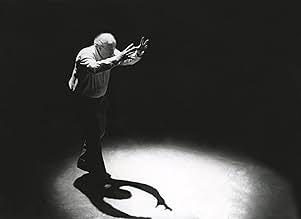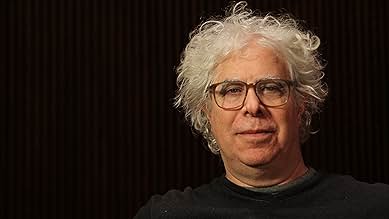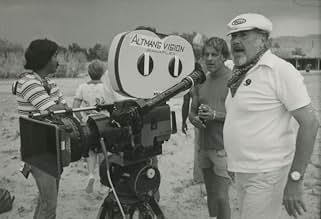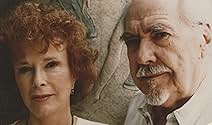CALIFICACIÓN DE IMDb
6.8/10
1.5 k
TU CALIFICACIÓN
Agrega una trama en tu idiomaA look at the life and work of American film-maker Robert Altman.A look at the life and work of American film-maker Robert Altman.A look at the life and work of American film-maker Robert Altman.
- Dirección
- Guionista
- Elenco
- Premios
- 1 nominación en total
Robert Altman
- Self
- (material de archivo)
Kathryn Reed
- Self
- (as Kathryn Reed Altman)
Donald Sutherland
- Self
- (material de archivo)
Dick Cavett
- Self
- (material de archivo)
Tommy Thompson
- Self
- (material de archivo)
Vilmos Zsigmond
- Self
- (material de archivo)
Matthew R. Altman
- Self
- (voz)
- (as Matthew Reed Altman)
Stephen Altman
- Self
- (voz)
Richard Nixon
- Self
- (material de archivo)
Shelley Duvall
- Self
- (material de archivo)
Paul Dooley
- Self
- (material de archivo)
- Dirección
- Guionista
- Todo el elenco y el equipo
- Producción, taquilla y más en IMDbPro
Opiniones destacadas
Robert Altman is admired amongst directors and actors, but despised amongst the producers of Hollywood. Isnt it ironic that some of his best work (The Player) is a terrific parody of all the pittfalls Hollywood digs for those trying to make a movie.
I have always wondered why there is such an admiration for him as a director, but the admiration grew out of his love for movie making and his love for the actors. And that love is being returned now. He treated his actors and his movie crew in a way few other Hollywood directors did. Robert Altman's movies seemed to be sort of a family/friends gathering of like minded spirits, who supported each other.
This guy made some terrific movies and he also made quite a few stinkers, movies that really were below par. But Robert Altman's talents never faded, his passion never faded, it was the Hollywood industry that did or did not give him the chance to film the way he wanted to, resulting in periods of success and periods of drought and failures.
I'll always remember Altman for his classic movies. And after seeing this movie I'll also will dearly remember him as a sort of a father of the actor's community. Too bad he got an early stroke, after which he finally had to give up drinking. But up untill then he lived his live to the fullest, giving us audiences worldwide several beautiful movie classics!
BRAVO !!!
I have always wondered why there is such an admiration for him as a director, but the admiration grew out of his love for movie making and his love for the actors. And that love is being returned now. He treated his actors and his movie crew in a way few other Hollywood directors did. Robert Altman's movies seemed to be sort of a family/friends gathering of like minded spirits, who supported each other.
This guy made some terrific movies and he also made quite a few stinkers, movies that really were below par. But Robert Altman's talents never faded, his passion never faded, it was the Hollywood industry that did or did not give him the chance to film the way he wanted to, resulting in periods of success and periods of drought and failures.
I'll always remember Altman for his classic movies. And after seeing this movie I'll also will dearly remember him as a sort of a father of the actor's community. Too bad he got an early stroke, after which he finally had to give up drinking. But up untill then he lived his live to the fullest, giving us audiences worldwide several beautiful movie classics!
BRAVO !!!
In 2014, a documentary about one of my favourite filmmakers was finally released. This is by no means a perfect documentary, but any film lover or fan of his work absolutely needs to see this.
Robert Altman started from the bottom of showbiz then worked his way up to directing tv shows. How? He did lots of lying. Then in 1970, he started the boom of new up and coming directors trying to make names for themselves. These new directors included Steven Spielberg, Martin Scorsese, and George Lucas, and the movement came to be known as "The New Wave of American Cinema". The year was 1970 and Altman created the well-liked 'Brewster McCloud' and the highly acclaimed anti-war film 'M*A*S*H'. Altman's desire to explore unconventional takes for his films led to making "anti-" films. 'M*A*S*H' had no violence making it anti-war. Some of these other "anti" film included anti-western (McCabe & Mrs. Miller, my personal favourite of his), and anti-friendship (3 Women).
By the late 70s, Altman was falling into a slump when his film 'Quintet' didn't live up to expectations of his earlier masterpieces. But it was the his live action take on 'Popeye' in 1980 that ruined his film career throughout the rest of the decade. Barely getting film offers anymore, he tried directing theatre. He loved theatre just as much.
Things were looking up when he made the darkly comical satire 'The Player' in 1992. He was back on top again. Everything about that film is pitch perfect. A year later he does 'Short Cuts', one of the best epics with multiple stories ever made. The remainder of his career saw some back and forth hits with his Agatha Christie inspired 'Gosford Park' and final film project 'A Prairie Home Companion' being notable highs.
It felt to me that this documentary moved a little too fast. Rather than gliding along everything, it tried to fit into some kind of allotted time. And I also felt that they should have gone into more detail on what made Robert Altman an auteur.
So this may not be perfect, but it is definitely a movie-lover's dream come alive.
3.5/4
Robert Altman started from the bottom of showbiz then worked his way up to directing tv shows. How? He did lots of lying. Then in 1970, he started the boom of new up and coming directors trying to make names for themselves. These new directors included Steven Spielberg, Martin Scorsese, and George Lucas, and the movement came to be known as "The New Wave of American Cinema". The year was 1970 and Altman created the well-liked 'Brewster McCloud' and the highly acclaimed anti-war film 'M*A*S*H'. Altman's desire to explore unconventional takes for his films led to making "anti-" films. 'M*A*S*H' had no violence making it anti-war. Some of these other "anti" film included anti-western (McCabe & Mrs. Miller, my personal favourite of his), and anti-friendship (3 Women).
By the late 70s, Altman was falling into a slump when his film 'Quintet' didn't live up to expectations of his earlier masterpieces. But it was the his live action take on 'Popeye' in 1980 that ruined his film career throughout the rest of the decade. Barely getting film offers anymore, he tried directing theatre. He loved theatre just as much.
Things were looking up when he made the darkly comical satire 'The Player' in 1992. He was back on top again. Everything about that film is pitch perfect. A year later he does 'Short Cuts', one of the best epics with multiple stories ever made. The remainder of his career saw some back and forth hits with his Agatha Christie inspired 'Gosford Park' and final film project 'A Prairie Home Companion' being notable highs.
It felt to me that this documentary moved a little too fast. Rather than gliding along everything, it tried to fit into some kind of allotted time. And I also felt that they should have gone into more detail on what made Robert Altman an auteur.
So this may not be perfect, but it is definitely a movie-lover's dream come alive.
3.5/4
Altman's life merits a 10-hour documentary. This is only 1½ hours, but we are treated to a decent selection of Altman trivia.
Gosford Park, M.A.S.H., Nashville, Short Cuts, The Player. Just wow.
The downside of cutting it down to a feature length documentary is that you are forced to skim through many great films. First of all, he made so many movies it's hard to keep track of them. Second of all, his movies are so dense that they require multiple viewings, and more than two minutes of exposition, to fully appreciate.
Nonetheless, I think the film is well-made and never boring.
Family videos and photos, and on-location footage, provide access to a rarely-seen Altman, such as Altman-the-father.
But don't expect great revelations. There is nothing truly shocking here, no skeletons in the closet. Altman is painted as a suspiciously lovable, but subversive, Santa Claus figure. Perhaps that's just the way he was.
But one would have liked a few rough edges to be explored a bit more - like his family troubles, financial worries and personal addictions to gambling and booze. The movies gets too close to hagiography at times. But if one is to pick Saints for canonization, you could do much worse than go with Robert Altman!
Gosford Park, M.A.S.H., Nashville, Short Cuts, The Player. Just wow.
The downside of cutting it down to a feature length documentary is that you are forced to skim through many great films. First of all, he made so many movies it's hard to keep track of them. Second of all, his movies are so dense that they require multiple viewings, and more than two minutes of exposition, to fully appreciate.
Nonetheless, I think the film is well-made and never boring.
Family videos and photos, and on-location footage, provide access to a rarely-seen Altman, such as Altman-the-father.
But don't expect great revelations. There is nothing truly shocking here, no skeletons in the closet. Altman is painted as a suspiciously lovable, but subversive, Santa Claus figure. Perhaps that's just the way he was.
But one would have liked a few rough edges to be explored a bit more - like his family troubles, financial worries and personal addictions to gambling and booze. The movies gets too close to hagiography at times. But if one is to pick Saints for canonization, you could do much worse than go with Robert Altman!
I am fascinated by the artistic process, how things are created, what motivates the artist, what obstacles are encountered and how they are overcome. In this documentary, I think Ron Mann has succinctly put together the various factors that motivated Robert Altman and made his career so long and successful. I felt I learned a lot more about the movie making process and artistic creation in general.
Simple things we now take for granted are important. For instance, putting together a team of people that work well together, giving people a break and letting them shine. These were radical ideas in the era of C2C Command and Control studio structures, where the word was passed down from on high. How about two people arguing, both speaking at the same time. Adds to the emotion and conflict right? Altman pioneered the use of multiple soundtracks to get right into a dialogue.
What I found particularly interesting was how Altman dealt with career setbacks. Each time things did not seem to be going his way (at least by the standards of others), he simply reinvented himself by turning to a different genre of film or theatre or production. When confronted by harsh critics, he simply shrugged it off and kept on working with undiminished enthusiasm. What a wonderful role model for young people starting off on a career. Bravo, great doc!!
Simple things we now take for granted are important. For instance, putting together a team of people that work well together, giving people a break and letting them shine. These were radical ideas in the era of C2C Command and Control studio structures, where the word was passed down from on high. How about two people arguing, both speaking at the same time. Adds to the emotion and conflict right? Altman pioneered the use of multiple soundtracks to get right into a dialogue.
What I found particularly interesting was how Altman dealt with career setbacks. Each time things did not seem to be going his way (at least by the standards of others), he simply reinvented himself by turning to a different genre of film or theatre or production. When confronted by harsh critics, he simply shrugged it off and kept on working with undiminished enthusiasm. What a wonderful role model for young people starting off on a career. Bravo, great doc!!
Ron Mann's rather soft documentary on movie director Robert Altman, who amusingly was fired by Jack Warner from his first theatrical film (1968's "Countdown") because of Altman's desire to have the actors overlap their dialogue. Altman, who began as a TV writer, slowly worked his way into the director's chair for a variety of television programs such as "Hawaiian Eye," "Bonanza" and "Combat!" It was on the series "Whirlybirds" that he met his wife, actress Kathryn Reed, who would remain by Altman's side for the remainder of his life. Home movies and behind-the-scenes footage highlights this otherwise unenlightening piece, with a narrative that reads something like this: "Once he finished that film, Altman began his next picture. After it was completed, he began a new project." There are a few nice touches (such as critic Gene Shalit's colorful TV review of Altman's "Popeye"), but otherwise extremely little about how each of Altman's eclectic projects were perceived by the public. Apparently an absentee-father, Altman, who passed away November 20, 2006, is nevertheless praised by the family members who took part in "Altman"; still, it's a documentary with only a passing resemblance to documentaries. ** from ****
¿Sabías que…?
- Citas
Robin Williams: Altmanesque? Ha-ha. Expect the unexpected.
- Créditos curiososNo hippies were harmed in the making of this movie.
- ConexionesFeatures Lo que no fue (1945)
- Bandas sonorasLes Boréades: Overture
Written by Jean-Philippe Rameau (as Jean-Phillipe Rameau)
Performed by John Eliot Gardiner
Selecciones populares
Inicia sesión para calificar y agrega a la lista de videos para obtener recomendaciones personalizadas
Detalles
Taquilla
- Total a nivel mundial
- USD 996
Contribuir a esta página
Sugiere una edición o agrega el contenido que falta

Principales brechas de datos
By what name was Altman (2014) officially released in India in English?
Responda
































